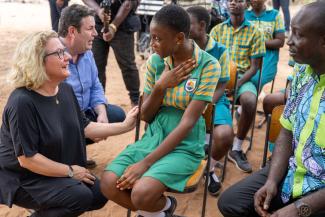German policy
BMZ makes bold statement of intent

The strategy’s title is “Shaping the future with Africa”. The BMZ hopes to cooperate with African countries in ways that create “a more just, more peaceful and safer world.”
The strategy defines focus areas for German development cooperation with Africa. It is designed to contribute to achieving the UN Sustainable Development Goals (SDGs) and support the Agenda 2063 of the African Union (AU).
A world in transition
The new Africa strategy comes at a critical time, marked by recent global crises such as the Covid19 pandemic and Russia’s attack on Ukraine. Moreover, demographic change, the climate crisis and shifting geopolitical dynamics necessitate international cooperation as well.
In this context, the BMZ is prioritising cooperation with African countries, the continent that is home to 33 of the world’s 46 Least Developed Countries (LDCs). Moreover, Europe and Germany have close historical, geographical and cultural ties to Africa.
The strategy is geared to achieving sustainable development. Overarching goals include:
- lending structural support to the achievement of the development goals set by the UN as well as the AU and its member states,
- enabling the continent to unlock its huge potential and become more resilient and
- cooperating with African partners for a global transformation to ensure that everyone can live in dignity and security in an intact environment.
The general idea is to address crises jointly and visibly with Europe’s neighbouring continent in a spirit of solidarity.
African voices must be heard
The BMZ strategy emphasises partnership in a spirit of respect and reciprocity. It states that African governments and the AU must get more attention in multilateral settings. Additionally, the BMZ would like to see African perspectives making a stronger impact on public opinion in Germany and in Europe.
It promises to engage in open and honest dialogue with an eye to promoting common values and pursuing shared interests with Africa. The BMZ recognises serious challenges, however. The trend towards authoritarian rule is gaining momentum in a number of its African partner countries, for example.
The new strategy emphasises gender justice. Svenja Schulze, Germany’s federal minister for economic cooperation and development is committed to feminist policymaking, seeking to overcome structural gender inequality in society and to boost women’s and girls’ involvement in political, social and economic affairs. Moreover, she has promised to promote the rights of marginalised groups, including people with disabilities, members of indigenous communities or LGBTQI+ individuals.
Focus areas
The new Africa strategy lists six main areas of cooperation:
- Employment and fair trade: African nations’ populations are growing fast. By 2050, Africa’s urban population alone is expected to triple to just under 1.5 billion. The BMZ estimates that Africa needs to create an additional 25 million jobs every year. The challenge is immense as the worsening climate and biodiversity crisis is hitting the continent hard. According to the BMZ, the existing wealth of natural resources and the technologies available today should allow Africa to become the first world region to make a “just transition” to sustainability by taking climate-smart approaches to development. To facilitate job creation, the BMZ considers it essential to promote trade, infrastructure development, private-sector employment and innovation. In regard to mounting sovereign-debt problems, the BMZ promises to support better public-finance management while also boosting governments’ capacity for debt-restructuring negotiations.
- Overcoming poverty and hunger: The BMZ plans to promote the transformation of agriculture and food systems in Africa to reduce hunger, malnutrition and poverty in general. It also wants to support the extension of social-protection systems as well as access to education. Social-protection systems are considered vital in building resilience especially in situations of crisis. The BMZ points out that inequality is contributing to many problems and should therefore be reduced.
- Health and pandemic prevention: The Covid-19 pandemic has tested global health systems and highlighted the need for better disease management. Since only about 20 % of the people in Africa have access to affordable primary health care of an appropriate quality, this sector must improve in particular. The BMZ pledges to support African health institutions as well as pharmaceutical production in African countries. It emphasises women’s access to health services and promises to invest in digitalising primary health care.
- Feminist development policy and gender equality: The BMZ will support gender equality through structural transformation that strengthens women’s rights such as sexual and reproductive rights. It will also establish and develop alliances for gender equality through supporting multilateral initiatives like the Global Partnership for Education, UN Women and UNFPA. Women’s economic participation and fighting gender-based violence are other priorities.
- Promoting good governance: Many African governments have officially made commitments to good governance, democracy, human rights and the rule of law. Nonetheless, many challenges persist. Corruption and illicit financial flows are among the greatest challenges. The BMZ hopes to promote effective public authorities which, however, need to be monitored by free media and underlie the review of independent law courts. The BMZ emphasises respect for human rights, moreover.
- Peace and security: The BMZ acknowledges that the continent is facing conflicts, with terrorist threats increasing fast. It recognises the African Union and its Agenda 2063 as key resources in promoting peace and security. It intends to tackle the root causes of violent conflicts in ways that strengthen communities’ resilience, prevent new conflicts and foster inclusive conflict resolutions. According to the new strategy, it is necessary to support refugees and internally displaced people.
Implementing the strategy, the BMZ will cooperate with African governments, supra-national institutions, non-state actors, private-sector enterprises and civil-society organisations. It will continue working with time-tested bilateral agencies such as GIZ and KfW as well as multilateral institutions. The BMZ promises to review the implementation of this new Africa Strategy and actively involve external partners.
Link:
BMZ, 2023: Shaping the future with Africa. The Africa strategy of the BMZ. (Also available in French)
Ronald Ssegujja Ssekandi is an alumnus of Ruhr Universität Bochum, lives in Uganda and edits D+C/E+Z’s Nowadays column.
sekandiron@gmail.com












